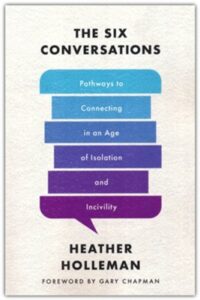The 2018 Cigna health study reported that nearly half of all Americans said they sometimes or always feel alone or left out. Younger generations are even lonelier. And that was before Covid! Other countries report the same.
Loneliness is not only a mental health issue. As I mentioned here, it is often at the root of our political polarization.
Much of this is because we are isolated and have forgotten how to talk to each other. How do we get out of this cycle? As someone who is not a great conversationalist, I found The Six Conversations by Heather Holleman, associate professor at Penn State, to be wise and practical. The place to start, she says, is with four mindsets.
 ♦ Be curious. Everyone has a backstory. Everyone has childhood memories. Everyone has learned hard or happy life lessons. Discovering this can be as easy as saying, “I’m so curious. Tell me about __________.”
♦ Be curious. Everyone has a backstory. Everyone has childhood memories. Everyone has learned hard or happy life lessons. Discovering this can be as easy as saying, “I’m so curious. Tell me about __________.”
By doing so we show that we value other people and open a door to connection. I’ve also seen that once a curiosity question is asked, it often gets turned back to the asker. “OK, I told you how I like to relax. What about you?”
♦ Believe the best. Social media and news media have trained us to start with a mindset of judging, shaming, and changing others. Much better for us and them to begin with acceptance, sympathy, and respect. Remember the grandparent or friend whose face lights up when they see us? We can be that for others.
We all know that in marriage or parenting, relationships just go better if we don’t jump to conclusions about motives or intentions. You may have heard the saying, “Be kind. Everyone you meet is fighting a hard battle.” How much better it is to start with that assumption if the laundry didn’t get folded instead of accusing someone of laziness!
♦ Express genuine concern. Holleman says that this means we are invested in another person. So yes, we start with sympathy or empathy, but we try to find appropriate ways to act too. “Investment doesn’t mean to take on everyone’s problems as your own, but it does mean you position yourself to support others as you can” (p. 33).
It means celebrating with those who celebrate and mourning with those who mourn. And if you’re not sure what the best way would be to do either of those, just ask about some specific options. “I want to hear more. What would be best—a walk, a call, going for coffee?” Or “How can I help—taking the car in for repair, watching the kids, bringing a meal?”
♦ Share yourself. The first three mindsets can have an amazing effect. But if we never talk about our own victories or defeats, the other person can feel like they are our project.
While we shouldn’t say we know just how someone feels about trouble at work, a parent being sick, or conflict with a neighbor (because we don’t know exactly how someone else feels!), we can say how we feel. “It makes me sad knowing you are in such a tough situation.”
After listening well and asking follow-up questions, we could also say, “What you’re describing makes me wonder what thoughts you might have about a situation I’m in.”
Taking in all four mindsets could be a lot. So start small. If we can grow in even one of the first two (be curious; believe the best), we can see real changes in our relationships.
Holleman offers much more to guide us into healthier and deeper relationships. The four mindsets are just the first chapter! In my next installment, I’ll focus on just one other aspect of her excellent book—how to ask great questions.

One thought on “Learning How to Talk to People Again”